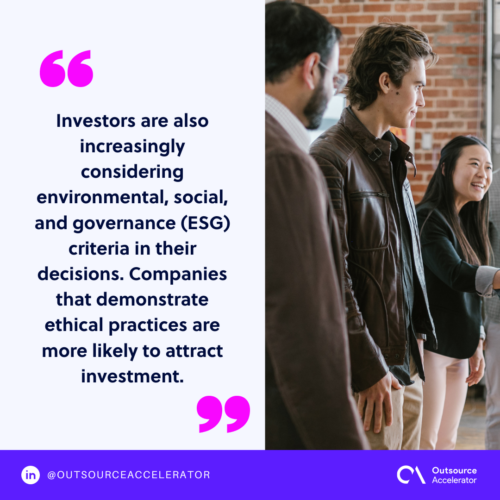Building a better workforce: The importance of ethical talent outsourcing

Finding the right talent to meet business needs has become more than just a numbers game. It’s about making sure that behind every skill set and expertise lies a story of fairness, respect, and dignity.
Ethical talent outsourcing isn’t just a buzzword – it’s a fundamental shift towards more responsible and humane business practices.
This practice is not just about accessing a large talent pool but also about embracing values that put people first. Done right, ethical talent outsourcing is a win-win that builds a stronger, more resilient workforce.
In the 491st episode of the Outsource Accelerator Podcast, Boldr Impact President and COO Mari Parker touches on what makes up an ethical talent outsourcing company.
What is ethical talent outsourcing?
Ethical talent outsourcing is the practice of hiring external talent or services while adhering to high standards of ethical conduct.
It ensures that all parties involved–whether employees, contractors, or suppliers–are treated fairly and with respect.
Key elements of ethical talent outsourcing include:
- Fair compensation
- Safe working conditions
- Labor rights
- Transparency
- Cultural sensitivity
- Environmental responsibility
- Legal compliance
The commitment to ethical hiring for organizations creates opportunities for ethical employment for talent worldwide and is an essential aspect of responsible business conduct. It enhances reputations and builds long-term, sustainable relationships.

7 Advantages of ethical talent outsourcing
Ethical talent outsourcing offers several advantages to organizations, which contribute to both business success and ethical responsibility.
Here are its seven key advantages:
1. Enhanced reputation and brand loyalty
Companies that prioritize ethical practices in their outsourcing are viewed favorably by consumers, investors, and other stakeholders. This positive image can enhance the overall brand reputation.
Ethical talent outsourcing can also foster customer trust and long-term loyalty, leading to repeat business and positive word-of-mouth.
2. Improved quality of work and productivity
Ethical talent outsourcing practices, such as fair wages and safe working conditions, lead to higher employee satisfaction and motivation. This results in better performance and higher productivity.
Ethical partners are more likely to adhere to quality standards and regulations, ensuring the high quality of the products or services delivered.
3. Long-term partnerships and stability
Ethical talent outsourcing helps build trust and mutual respect between the company and its outsourcing partners. This leads to more stable and long-lasting partnerships.
4. Positive impact on employee morale and engagement
Employees are more likely to feel proud of their company when it is committed to ethical practices. This enhances overall morale and engagement.
By treating workers fairly, companies can reduce employee turnover. This results in stabilizing the workforce and reducing the costs and disruptions associated with high turnover rates.
Mari states that Boldr Impact emphasizes this value.
“We always start with our team members, understanding the impact that has on our ability to deliver amazing services and our overall growth in the last couple of years.”
5. Innovation and continuous improvement
Ethical talent outsourcing brings fresh perspectives and new ideas to the organization.
A fair and respectful work environment encourages creativity and innovation, as employees feel valued and motivated to contribute new ideas. This drives a competitive advantage in the marketplace.
6. Social and environmental benefits
Ethical talent outsourcing can contribute to the socio-economic development of communities by providing fair wages, safe working conditions, and opportunities for growth.
Mari understands this, being honest about growing up privileged in South Africa.
According to her, Boldr Impact has allowed her to “find ways to give back to the community there.”
Additionally, companies that adhere to ethical standards often implement environmentally friendly practices. This contributes to the protection and preservation of natural resources.
7. Financial performance
Ethical practices may involve higher upfront costs. However, they often lead to long-term savings through improved efficiency, reduced turnover, and avoidance of legal fees and fines.
Investors are also increasingly considering environmental, social, and governance (ESG) criteria in their decisions. Companies that demonstrate ethical practices are more likely to attract investment.

Pitfalls of unethical talent outsourcing
Unethical talent outsourcing practices can lead to various pitfalls that may negatively impact both the organization and the individuals involved.
Here are some potential pitfalls of unethical talent outsourcing:
Worker exploitation
One of the most significant risks of unethical talent outsourcing is worker exploitation. This includes unfair wages, unsafe working conditions, and a lack of basic labor rights.
Exploitative practices harm the workers’ well-being and tarnish the company’s reputation, potentially leading to legal consequences.
In contrast, Mari highlights empathy as a key virtue in how Boldr manages its staff.
“Empathy [is] at the heart of what we do. And my challenge to my team is, ‘How do we design everything we do for our clients and team members in an empathetic way?’
…And so we make sure we live and breathe these values in a way that will organically continue the culture we have at the company.”
Financial losses
Companies may be required to pay compensation to workers affected by unethical practices. This can include back wages, damages for injuries, or compensation for wrongful termination.
Furthermore, ethical lapses can result in lost contracts and partnerships. Other businesses, particularly those with strict ethical standards, may refuse to collaborate with a company known for unethical practices.
Poor work quality
Engaging in unethical talent outsourcing may result in receiving substandard work from contractors or vendors.
Without proper oversight or quality control measures in place, organizations risk receiving deliverables of inferior quality. These negatively impact the organization’s operations, reputation, and customer satisfaction.
Legal and compliance issues
Engaging in unethical talent outsourcing practices can expose organizations to legal and compliance risks. Governments and international bodies are increasingly vigilant about enforcing these standards.
Non-compliance can result in penalties, lawsuits, and damage to the organization’s reputation, jeopardizing its long-term sustainability.
Negative impact on local communities
Practices not in line with ethical talent outsourcing rarely consider the social impact on local communities. The results are tensions, resource exploitation, and environmental degradation.
5 Best practices for ethical talent outsourcing
Implementing best practices for ethical talent outsourcing is crucial for ensuring that your company complies with legal standards and fosters a positive, sustainable impact.
Here are five best practices for ethical talent outsourcing:
1. Conduct due diligence
It’s essential to conduct due diligence and research on potential outsourcing partners. Be sure to review their labor practices, environmental policies, and industry reputation.
2. Promote transparency and accountability
Both parties should be transparent and communicate clearly from the start to establish mutual understanding and expectations.
Clear communication can help reduce the potential for misunderstandings, delays, and other issues.
Within the company, Mari says that it’s important to be “diligent with your communication to make sure your team understands who you are and what you stand for.”

3. Prioritize fair labor practices and employee well-being
Ethical talent outsourcing partners should prioritize fair labor practices and prioritize the well-being of their employees.
This can include fair wages, safe working conditions, reasonable working hours, and adequate opportunities for professional development and advancement.
4. Establish clear ethical guidelines and contracts
Create a detailed code of conduct that outlines the ethical expectations for all outsourcing partners.
This should cover areas such as fair labor practices, environmental responsibility, and anti-corruption measures.
5. Include local and diverse perspectives
Organizations should strive to include local and diverse perspectives and voices, especially if outsourcing work to different regions of the world. This can help ensure that the products, services, and processes align with the local culture and meet the needs of diverse customers.
Mari recalls a quote from her father: “It takes all sorts of people to make the world go around, even people like you and me.”
She says, “For me personally, it’s creating a space of inclusivity, a space where people can find a sense of belonging and then trusting that the individuals will navigate that opportunity [in] a way that is thoughtful and intentional.”
To learn more about Boldr Impact, you may visit its website.







 Independent
Independent




